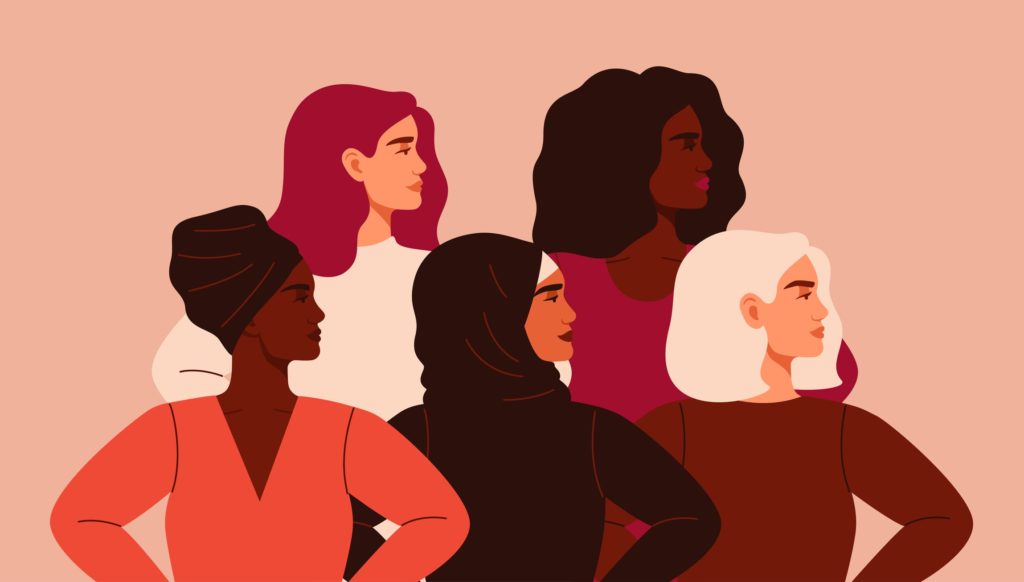Giving compliments seems like a pretty simple concept, right? You say something nice, that’s all there is to it. But linguists who study compliment behavior have actually found that the practice is much more interesting and complex — and gender-specific — than you might think. As a linguist and author of Wordslut: A Feminist Guide to Taking Back the English Language, I am perpetually fascinated (and occasionally frightened) by the way gender standards and stereotypes creep into the words we use every day.

First, linguists across the globe have found that for English-speaking women, exchanging compliments on sight is about as common and expected as saying, “Hi, how are you?” In 1988, the feminist sociolinguist Janet Holmes analyzed a volume of 484 compliment exchanges and determined that 51% of them were from one woman to another, while only 9% were between men. For women, praising another woman’s appearance as soon as you see them (“You look so nice,” “I love your outfit”) is both customary and unremarkable (which strikes me as ironic, seeing as it wasn’t women who decided that so much of their worth should rest on their appearance, and yet, women are often the only ones letting each other know that they’ve succeeded. But that’s another article for another day). By contrast, for a cisgender man to compliment another cisgender man on his hair, clothes, or body would be, as Holmes writes, “an extremely face-threatening thing to do,” as our culture has convinced them that such an act would make them seem “gay.” Heaven forbid.
In a different study from 2009 titled “The compliment as a social strategy,” linguists Nessa Wolfson and Joan Manes concluded that compliments don’t exist “just to be nice,” they serve an underlying purpose: “creating or reinforcing solidarity between the speaker and the addressee.”
But, because we live in a society that doesn’t actually want women to empower each other or form “too much” solidarity, sometimes we wind up doling out “compliments” that don’t foster connections between women at all. On occasion, what may seem like tokens of praise are just backhanded, pseudo-empowering judgments that reinforce sexist conventions, ultimately making women feel worse about themselves. Sometimes, even when we think we’re saying something sweet, the patriarchy manages to swoop in and ruin it for everybody. Luckily, we have the power to overcome it.
Below are nine “compliments” that don’t actually do what compliments should… as well as more empowering alternatives to consider instead.
“You’re so brave.”
I’ve spoken to dozens of women, from memoirists to cancer survivors (basically any woman who’s ever done anything remotely hard), who’ve all vehemently expressed their distaste for this backhanded accolade. “Brave” can sometimes come off as condescending because it often carries a few underlying assumptions: a) that the complimenter’s standards for their subject were so low that they assumed she wouldn’t be able to handle something difficult, b) that bravery — as opposed to, say, intelligence or perseverance — was the main quality required to accomplish whatever they did, and c) that they’re some kind of non-human hero when really they’re just a person who did what they had to do in order to weather a challenge, which they may have not even chosen for themselves. “Brave” is of course not a dirty word, and it certainly has its place as a compliment, but before you use it next, perhaps think about if there’s a more respectful and empathetic way to voice admiration for what someone has done.
Try: “Your story really speaks to me. Thank you for sharing it.”
“You’re so articulate.”

Particularly when a white person uses terms like “articulate” or “well-spoken” to describe a BIPOC person’s speech, that’s not a compliment — it’s a micro-aggression. It stands to imply that the person of color is defying some problematic expectation of how they “should” sound, according to stereotypes.
“We’re all familiar with the scenario in which someone comments in surprise at how ‘professional’ or ‘well-spoken’ a new black co-worker comes across, or how ‘articulate’ an African-American presidential candidate might be,” wrote A. Gordon in The Root. “In that context, the underlying message is clear: We (a white-dominant society) expect black folks to be less competent. … When we call a person of color articulate, it can suggest — either intentionally or unintentionally — that she’s exceptional, whereas, by contrast, it can suggest that white people are automatically assumed to be articulate.”
So, before complimenting a woman for her “eloquence,” ask yourself: Is it necessary to call attention to this person’s speech? Because maybe it’d be better — more specific, more inclusive, and more accurate — to angle your compliment toward the content of her statement, rather than the delivery.
Try: “Your ideas are inspired” or “Your enthusiasm is infectious.”
“You’re such a girlboss!”
There’s a bevy of mixed messages out there surrounding words like “girlboss,” “mompreneur,” and “SHE-EO,” but I tend to avoid them because ultimately what they do is illuminate the notion that words like “boss,” “entrepreneur,” and “CEO” are male by default. The “female version” of these terms suggests that when a woman endeavors in business, we can’t help but to cutesy-fy her title. Not to mention, “girlboss” is a diminutive; can you imagine calling an adult male a “boyboss?” It’d be absurd. Girlboss may read as a sparkling emblem of feminine power, and it certainly makes for a snappy hashtag, but in practice, terms like that don’t quite work to undo implicit sexism in language — they reinforce it.
In the end, it’s your choice whether or not you enjoy the word “girlboss,” but when complimenting other women, I’d recommend opting for a more inclusive alternative.
Try: “I’m so inspired by your entrepreneurship.”
“You look so skinny.”
Here’s the thing: Commenting on someone else’s body can get incredibly touchy, because not only might you be projecting a divisive beauty standard onto the person, but also, the perceived positive change in their appearance might be outside of their control or the result of a negative experience you may not know about. Stress, illness, and eating disorders are all reasons why someone might look “skinny” that you wouldn’t necessarily want to praise. In general, when complimenting someone’s appearance, it’s wise to stick to elements of their look that they’ve clearly chosen themselves — as an article of clothing or a lipstick shade. Or, even better, direct the complement toward the beautiful *vibes* they’re emitting, as opposed to their exterior.
Try: “You look radiant!”
“Wow, I could never pull that off.”

Here’s one that’s often uttered whenever someone wears something or cuts their hair in a way that even remotely defies the “norm.” The complimenter might think they’re expressing awe or appreciation, but when you read between the lines of this “compliment,” it seems to say: “What you’re doing is abnormal. It kinda scares me. I’ll never do that.” Not to mention, this phrasing unnecessarily turns the “compliment” away from the subject and onto the speaker. (That person’s pixie cut isn’t about you!) Simply put, if you like what someone’s got going on, just say something sincerely kind about it — something that will make them feel good. And if you don’t have anything sincerely kind to say, move along!
Try: “That lipstick/suit/etc. is fantastic/fire/etc.”
“You’re such a firecracker/spunky/sassy.”
Though these words are not explicitly sexist, they are tacitly coded female — meaning, they’re words you’d almost never use to describe a man. They can come across as belittling because the subtext tends to be: “Women are expected to be docile and polite, but wow, you actually seem to have a personality! How deviant!” When praising a woman’s outgoing or magnetic persona, consider using language that’s more specific and truly gender-neutral.
Try: “Your charisma is captivating.”
“That glow-up though!”
Glow-up = you look great now, but you didn’t always. It’s totally fine for someone to reference their own glow-up, but to suggest that another person “glowed up” (“glew up?”) could make them feel self-conscious about their past self. Not worth the risk. But here’s an easy fix…
Try: “You are glowing!”
“Where do you get your confidence?”

This one happens to be a personal pet peeve. Once, while attending a book club meeting full of mostly white Bay Area women in their 30s who had read my book, Wordslut (I didn’t know them, they just asked if I’d join, and I happily obliged), one of the attendees asked me the following question: “As a young woman, where did you get the confidence to write a book?” The remark flustered me because, underneath the apparent compliment, I heard two things: 1) where do you get off daring to speak with authority in public as a woman under 30? And b) if only I had confidence like you, then I could publish a book, too.
This attempted compliment wound up communicating an assumption that I had some rare abundance of confidence and that’s what allowed me to write my book (as opposed to years of studying, dedication, and craftwork), as well as the sexist implication that this presumed confidence was unnatural for a young woman like me and that I must have done something calculated to acquire it. It was odd because this woman had just read a whole book I’d written about gender and language myths, and then proceeded to ask me a question I am quite certain she would not have asked a 28-year-old man.
Bottom line: If you are inspired by someone’s accomplishments or boldness, try telling them about the positive effect it’s had on you, instead of unintentionally making a gendered (and not-so-flattering) insinuation about them.
Try: “You give me the confidence to own who I am.”
“I’m so jealous of you.”
In the spirit of women supporting other women, let’s agree not to pin negative emotions like jealousy onto them. Similar to the comment about someone looking “skinny,” you never know the full story of what someone is going through, and even if their situation looks enviable on the outside, no one’s life is perfect, and by telling someone you’re jealous of them (even casually), you might be putting them in the uncomfortable position of having to explain why there’s no jealousy needed. After all, a compliment is meant to bring people closer together, right? Not widen the divide.
Try: “I so admire you for [moving to a new city on your own, starting your own business, building such a dynamic life, etc]. I hope to do something similar one day.”
We only recommend products we have independently researched, tested, and loved. If you purchase a product found through our links, Sunday Edit may earn an affiliate commission.







